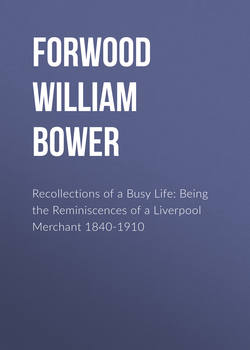Читать книгу Recollections of a Busy Life: Being the Reminiscences of a Liverpool Merchant 1840-1910 - Forwood William Bower - Страница 13
CHAPTER III.
LIVERPOOL
The Volunteer Movement
ОглавлениеNo account of the doings in Liverpool in the 'sixties would be complete that did not describe the beginnings of the great volunteer movement, which was destined to occupy so much public attention, and to form such an important portion of our national defence. Liverpool can certainly claim to have initiated the movement. Mr. Bousfield endeavoured to revive this branch of the service in 1853. A few years later he formed a drill club, a very modest beginning, consisting of only 100 men, wearing as their uniform a cap and shell jacket. Captain Bousfield endeavoured several times to obtain recognition by the Government, but failed; and he had to encounter a considerable amount of chaff and ridicule. The public had but little sympathy with the young men who "played at being soldiers." Captain Bousfield was not discouraged, he loved soldiering and was an enthusiast, and his opportunity was soon to arrive. In 1859 the Emperor Napoleon III. became very threatening in his words and ways, and it was apprehended that he might attempt to invade our shores. Captain Bousfield quickly obtained the support of the Government for his volunteers, and the 1st Lancashire Volunteer Regiment was formed. The movement made rapid headway, until we had enrolled in the country upwards of 300,000 men. Colonel Bousfield soon obtained the command of a battalion, and in 1860 was presented with a sword of honour and a purse of £1,800. Liverpool furnished her full quota of volunteers. Colonel Brown commanded a regiment of artillery: Colonel Tilney the 5th Lancashire, a crack regiment; Colonel MacCorquodale the Press Guards; Colonel Bourne, with Major Melly and Captain Hornby (afterwards Colonel H. H. Hornby), the 1st Lancashire Artillery; Colonel MacIver commanded 1,000 of his own men; and among other active volunteers at this time we remember Colonel Steble, Colonel Macfie, Colonel Morrison, Colonel Clay, and many others.
We had also a squadron of cavalry, called the Liverpool Light Horse, Captain Stone in command. I joined the squadron in 1859, and greatly fancied myself mounted on one of my father's carriage horses. We exercised in some fields behind Prospect Vale, Fairfield.
I remember the 1st Lancashire being encamped on the sandhills between Waterloo and Blundellsands. It was the first time any volunteers had been under canvas, and the camp was visited by crowds of people.
